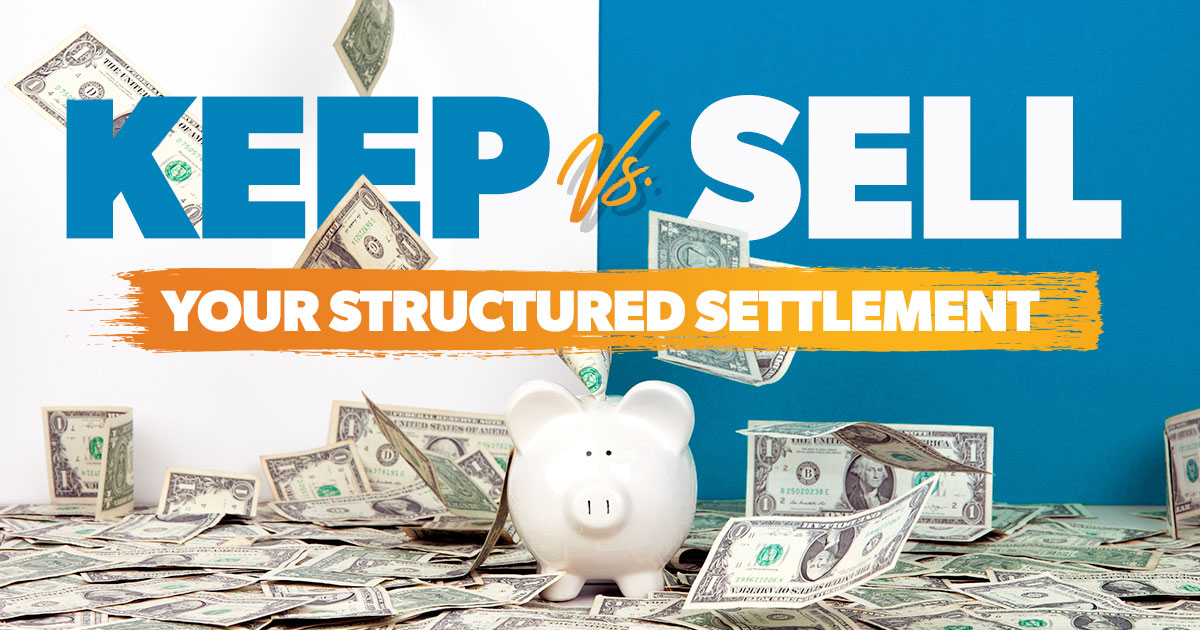
Should you sell a structured settlement? The advice you’ll hear will range from “heck, no” to “absolutely.” It really depends on your case. But one thing is universal about selling a settlement—you’ll lose money every time.
That doesn’t necessarily mean you shouldn’t sell. If you’re smart about investing, you could end up with more money in the long run. You just have to understand what you’re selling—and at what cost.
First, let’s understand exactly what a structured settlement is.
What Is a Structured Settlement?
A structured settlement is pretty simple to understand—it’s essentially the money being paid to “right a wrong.” Structured settlements are a regular stream of tax-free payments over a set period of time. They’re pretty common practice and typically awarded for lawsuits regarding:
- Personal injury
- Workers' compensation
- Medical malpractice
- Wrongful death
When a lawsuit is filed, the defendant (the person or party who’s accused) may agree to pay out a structured settlement on their own to avoid a lawsuit, or the case may go to court. If it goes to court and the defendant is found responsible, the judge will decide on a dollar amount to make up for the damage done to the plaintiff (the person or party who was wronged).
If it’s not a huge amount of money, the plaintiff might have the option to receive a lump sum settlement (all of the money at once). It’s like if someone rear-ended your parked car and dented your fender. If that happened, you’d likely get a lump-sum check from their insurance company for the amount that it would cost to fix your damaged fender.
But it’s a whole different ball game when dealing with settlements of $100,000 or more. With larger payments, the courts typically decide that the plaintiff will be paid through a structured settlement.
How Do Structured Settlements Work?
When a structured settlement is ordered or agreed upon, the at-fault party will put the money toward an annuity. An annuity is a financial product that secures payments for the plaintiff from an insurance company. (And it works similar to insurance, except that the payment for the premium is coming from one party and being awarded to another.) Now, generally, we don’t recommend annuities. For most folks, they just don’t make sense. But with structured settlements, you don’t typically have another option.
There are a few terms to a structured settlement that are agreed upon, including:
- How much the regular payments will be
- How long they will continue
- How often they will be paid
- Whether they will increase or be accompanied by larger payments at certain times
The plaintiff can also decide whether to start receiving the funds right away (immediate annuity) or if they’d rather wait (deferred annuity). Some people may need the money right away, and others may decide they’d benefit from receiving their payments later, like after they retire. But annuities gain interest, so you’ll benefit financially if you wait. Also, keep in mind that if you take out any money from a deferred annuity before age 59 1/2, you’ll get hit with a 10% early withdrawal fee on top of the income tax you’ll owe!
Should I Sell My Structured Settlement?
There are many advantages to keeping a structured settlement. For one, you’ll be receiving guaranteed, tax-free payments. Also, spreading out the payments over time instead of getting the lump sum will likely save you from making the foolish purchases people tend to make when they get a lot of money overnight (can you say QVC shopping?). And it’s worth repeating—an annuity gains interest! That means you’ll get more from a structured settlement over time than if you would have received a lump sum.
Save more money for the things that matter (to you) with EveryDollar.
While not everyone has the option to get the lump sum, everyone does have the option to sell their structured settlement. But just because you can doesn’t necessarily mean you should. Know that no matter who you sell your settlement to, you’re selling it at a discount. What you have to be careful of is how deep the discount is. You’re guaranteed to get a smaller amount of money if you get the cash out now, because the money won’t have time to gain interest. But if you invest your money right, you could make up for that lost cash or even have it grow past what it would’ve become in the annuity account.
There’s nothing wrong with getting a buyout of a structured settlement if the discount isn’t super deep, but make sure you have a very good reason for selling your settlement. For example, it could be worth it if you’re needing to pay for immediate medical care, pay off a mountain of debt, or buy a house. But if you’re planning to cash out and hit the Vegas strip, we’re going to strongly advise you don’t touch that money.
The best way to decide if you should sell is to sit down with a financial advisor and crunch the numbers. Shop around for the companies that buy out these settlements and see what kind of offers you get. Then talk those numbers out with your financial advisor and see how bad of a hit you’d be taking by selling the settlement.
Connect With a Financial Advisor
Don’t have a financial expert in your corner? Our SmartVestor program can connect you with up to five financial advisors who know their stuff and want to help. The pro you choose to work with can look at your situation, answer your questions, and help you make informed decisions when it comes to your settlement. You don't have to make such a big financial decision alone.

